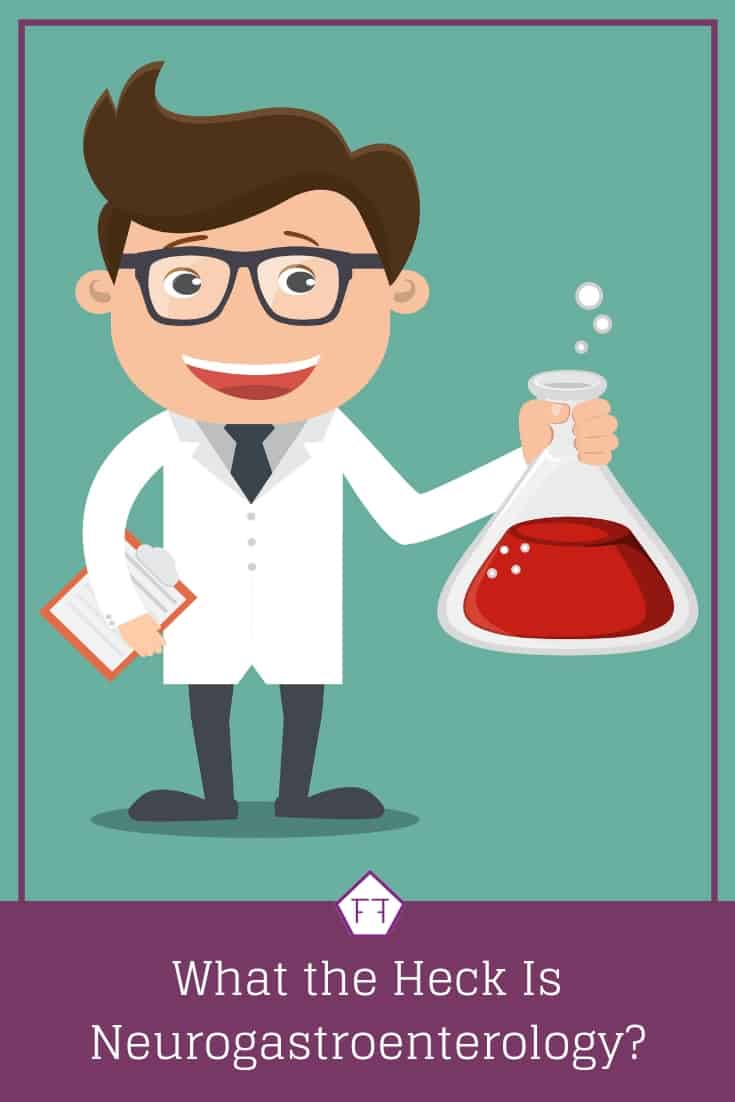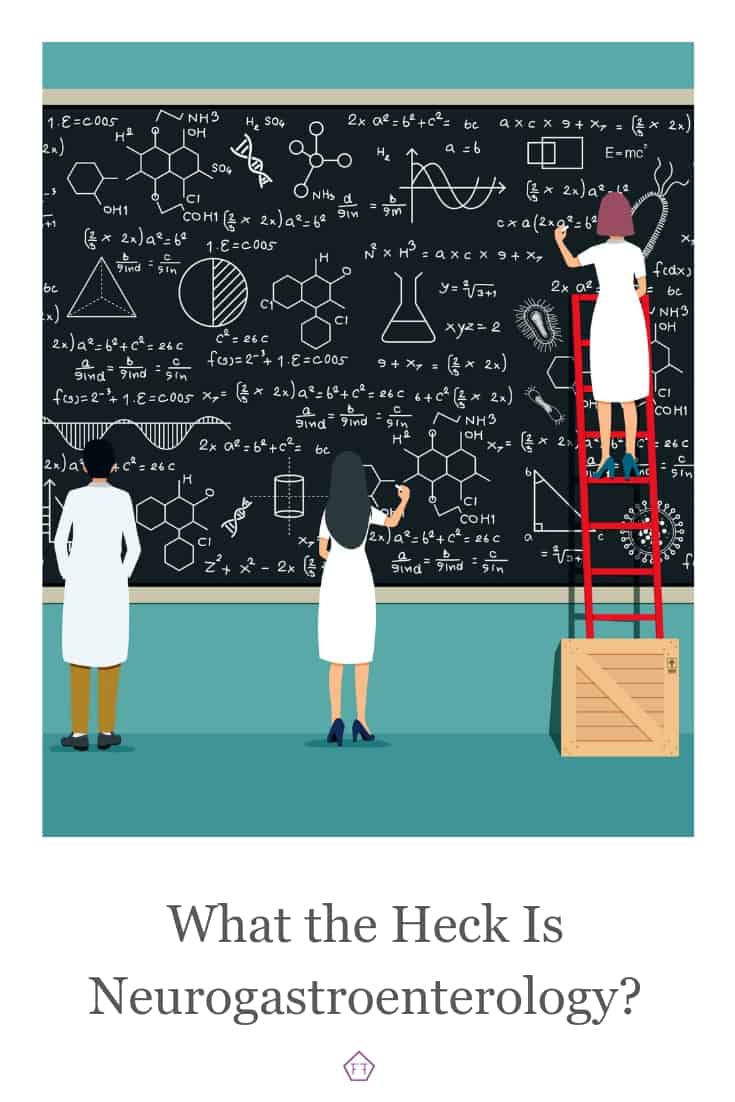Have you heard of neurogastroenterology? While it’s a bit of a mouthful, if you suffer from IBS, IBD, or another functional gut disorder, neurogastroenterology is definitely something you should be excited about! Check out the article below for everything you need to know about what neurogastroenterology is and what it can do for you.

What is Neurogastroenterology?
When I first discovered the field of neurogastroenterology, I had a ton of questions! What is neurogastroenterology? Is a neurogastroenterologist a neurologist or a gastroenterologist? Is it something new entirely? How do you become a neurogastroenterologist? What does a neurogastroenterologist do?
I took these questions (and many more) to Dr. Martin Storr, Professor of Gastroenterology with the University of Munich and President of the German Society of Neurogastroenterology and Motility.
When asked to describe the field of neurogastroenterology, Storr explained that “neurogastroenterology is a term designating gastroenterologists with a scientific interest and an academic background in Functional Gastrointestinal Disorders (FGID) and Inflammatory Bowel Disease (IBD).” Specifically, it involves understanding the mechanisms in the body involved with FGIDs and IBD.
Storr clarified “a large number of these mechanisms involve nerve cells as indicated by the word “neuro” but there is much more beyond nerve cells.” In fact, the field of neurogastroenterology looks at the brain, spinal cord and specific parts of the nervous system, as well as the actual mechanics of your digestive system, inflammation, innate immune system, nutrition, microbiology, environmental, and genetic factors that may influence FGIDs and IBD.
According to Storr, to be certified as a neurogastroenterologist, a gastroenterologist must complete specialized training. Storr received his certificate of neurogastroenterology from the Society of Digestive Diseases (DGVS) in Germany. To his knowledge, this is currently the only certification program available.
How Does the Field of Neurgastroenterology Impact IBS?
When asked what unique skills or perspective a neurogastroenterologist could provide to people with IBS, Storr said, “neurogastroenterologists provide a broad background of knowledge which can help identify the most promising treatment approach for patients.”
He also indicated a neurogastroenterologist may take more time to listen to patients complaints and to clearly explain what is happening and what to do about it. This alarmingly unique perspective would likely help dispel the belief that IBS is a “diagnosis of exclusion” or a “trashcan diagnosis.” Though, this perception of IBS is still quite popular in the IBS community.
In reality, updates to the ROME IV criteria in 2016 outline IBS as a specific and well-defined disorder. When asked about IBS as a diagnosis of exclusion, Storr called these statements “medieval.” He expanded on this comment saying:
In recent years modern IBS diagnosis workflows were standardized and based on cardinal symptoms. This allows a faster and more precise diagnosis and reduces the number of unnecessary tests, which I think is a very positive development. Modern IBS diagnostic algorithms follow a clear alley and allow a positive diagnosis of IBS or any other FGID. There may still be a lack of clear communication but “trash can diagnosis” is a statement of the past.
If you want to know more about the specific criteria required for an IBS diagnosis, check out this article.

How Will Neurgastroenterology Impact Future Research?
While the field of neurogastroenterology is still a relatively new specialization, it’s already had a positive impact on research related to IBS and other FGIDs. This research includes studies on the impact of the brain-gut axis, the microbiome, inflammation, and dietary practices among other important areas of study.
When asked what area of research he finds exciting right now, Storr said: “I personally find the interaction of gut and microbiome most breathtaking since microbiome interactions with food processing, immune actions, and emotions, just to name some, may explain lots of things that are going wrong in IBS.”
Storr indicated that in the future he expects to see biological markers (“biomarkers”) that will help physicians provide a positive IBS diagnosis. He also believes these biomarkers will be helpful in monitoring disease activity and helping clinicians make appropriate treatment choices.
While there are many important research projects brewing in the field of neurogastroenterology, Storr was quick to highlight how gaps in our current knowledge may temporarily delay important breakthroughs.
“There is a large gap between the exciting discoveries in FGID basic science and translating these fascinating findings into modern treatment options. Our knowledge on the importance of the gut-brain-axis is solid, the concept of visceral hypersensitivity is fundamental, other knowledge on microbiome, nutrition and inflammation is exciting. But translation, with the exception of dietary guidance, has somewhat fallen behind. This needs to be worked on.”
Hopefully, as knowledge increases in each area of study, researchers will make practical connections between what they’ve discovered and how that knowledge can improve the quality of life for people living with FGIDs and IBD.
Neurogastroenterology and the Low FODMAP Diet
While researchers have been unable to translate what they’ve learned about the brain-gut axis and the microbiome into practical drug therapies, one branch of neurogastroenterology has made a major leap forward. “It’s nutrition,” says Storr. “The development of the low-FODMAP diet implemented a fundamental change for IBS patients and introducing the low-FODMAP diet is life changing to many patients.”
Storr reports that the Low FODMAP Diet has been proven in “countless excellent clinical trials.” And that it has the potential to increase the quality of life for people who suffer from IBS.
The Low FODMAP Diet was developed by the Department of Gastroenterology at Monash University in 2005. Since then, they have published several studies showing the Low FODMAP Diet may improve symptoms of IBS by up to 70% in 3 out of 4 patients.
When asked if he has recommendations for people who want to try the low FODMAP program, Storr said:
“A successful low-FODMAP diet depends on a small number of key features. One is willingness. Without a positive attitude and expectation life-style changes like dietary changes will not help.
“The next key feature is information. Someone willing to try needs correct and precise information rather than random lists of unknown background.
“The third key feature is fun. The more fun you have with your food choices, the longer you will stay on the diet. Here books and internet blogs with stories of individuals and scrumptious recipes are very important.”
Storr went on to reiterate that the source of the information used is critical to a patient’s success on the low FODMAP program. “Someone who got good, professional, understandable and extensive information will do much better compared to someone who got a simple list only.”
Professionals who are able to support a patient through the Low FODMAP Diet include gastroenterologists and FODMAP-trained dietitians. These professionals can help you work out the nuances of the program (like the difference between weak and strongly steeped tea) that might derail someone attempting the program on their own. Storr firmly believes that “with reasonable handling and sufficient information there are no limitations.”
Final Thoughts
That was a ton of information, so let’s debrief! A neurogastroenterologist is a gastroenterologist with a scientific interest and an academic background in Functional Gastrointestinal Disorders (FGID) and Inflammatory Bowel Disease (IBD). While the field of neurogastroenterology is new to you and me, these researchers have been busy learning about everything from the brain-gut axis and the microbiome, to the way our muscles move or don’t move, to the way our diet directly impacts our bodies.
While some of this information has yet to translate into a treatment protocol, a new drug, or even better, a cure; major breakthroughs like the development of the Low FODMAP Diet have directly improved the lives of IBS patients. So, keep your eyes peeled for future developments from this exciting field of research!
If you like this post, don’t forget to share it! Together we’ll get the low FODMAP diet down to a science!
You might also like one of these:
What Is a FODMAP? Have you heard of FODMAPs? These pesky little carbohydrates can throw a monkey wrench in your digestive system. Check out this article for a description of each FODMAP group and how it may impact you in plain English.
What Is the Low FODMAP Diet? Are you interested in trying the Low FODMAP Diet? Check out this article for a clear description of each stage of the low FODMAP program.
What Is Referred Pain? You already know IBS can be a pain in the butt. But, did you know it can also be a pain in the back? Check out this article for everything you need to know about this common but complicated issue.


